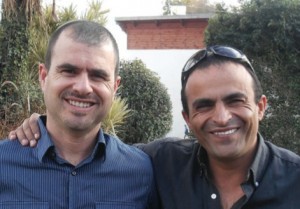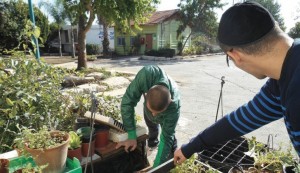Lachan co-founders Yoni Riskin and Avichai Yosef
As Rafael stood before the juvenile court judge, he was given a stark choice: either join one of Israel’s heavily supervised “youth villages†for teenagers at risk…or go straight to jail.
Before this pivotal moment, Rafael’s life was moving steadily and irreversibly in one direction. Running with a criminal crowd in his hometown of Rehovot, increasingly under the influence of drugs, and never far from an undercurrent of violence that had, in this final conviction, involved a knife attack with another teen, Rafael, now 19, was out of options. He chose the youth village and the judge assigned him to a program run by the non-profit organization “Lachan.â€
Lachan operates three youth villages for troubled young adults, from ages 12-18, in the north, center and south of Israel, as well as a program for college students. The organization was founded by Yoni Riskin and Avichai Yosef in 2001. Riskin is no stranger to social entrepreneurship; his father, Rabbi Shlomo Riskin, was one of the founders of the town of Efrat and Lachan got its start in the community, taking over a couple of broken down and unused caravans to create an alternative educational program for troubled teens.
For Rafafel, the three years he spent living at Lachan’s “Yedidut†youth village on a quiet moshav near the city of Lod were nothing short of transformative. Today he is off drugs, out of jail and volunteering as a counselor for similar at-risk kids while waiting to enlist in an elite unit of the Israel Defense Forces. Entering the army is an achievement on its own: for teens with a criminal record, the IDF essentially prevents them from signing up and receiving all the significant social and financial benefits that military service in Israel provides.
Rafael says his experience at Lachan wasn’t smooth sailing from day one. “I was still involved with violence and taking drugs when I would come home for the weekends,†he says. “I didn’t believe I could make a change and I didn’t really want to. I just wanted to go back to what I knew; a life without any rules.â€
But the counselors and therapists at Lachan were not so fast to give up. “They believed in me, they saw I had a spark in my eyes and potential,†he continues. “Moreover, they provided important personal examples. For the first time, I found role models I could aspire to.â€
38-year-old Yoni Riskin was one of those role models. He says his interest in working with this population started while he was in the army. “I was a sergeant and was assigned some new recruits who had very difficult home and social lives,†Riskin says. “My heart just went out to them. I began speaking with their families, trying to help them with the personal difficulties they were going through. That’s when I realized I wanted to devote my professional life to working with teens at risk.â€
When he finished his IDF service, Riskin trained to become a counselor with a program that helps teens at risk in one of Jerusalem’s poorer neighborhoods. His childhood friend, Avichai Yosef, now 38 as well, was similarly engaged in non-formal education as the project director of a prestigious pre-army academy. The two decided to join forces and opened the first incarnation of Lachan.
“At the beginning, we didn’t have a shekel,†Yosef says. “We just had a dream and a group of kids that had nowhere else to go.†Riskin and Yosef shnorred a table here and a chair there, and assembled a team of volunteers to tutor students in math, Bible, English, Hebrew grammar and history. What started as classes three days a week quickly morphed into a full-time, live-in program. The caravans were converted to dormitories.
“We realized that, in order to straighten these kids out, we needed to not only change their days but their nights too. You can’t get kids to come in the mornings if they’re out all night getting into trouble. But if they’re with us, it’s lights out at 11:00 PM and up at 7:00 AM,†Riskin says.
After its initial years in Efrat, Lachan continued to grow and, in 2007, moved to a more spacious location at Kibbutz Ein Tsurim. Before long, Lachan was on the road again, this time, renovating a former psychiatric facility for children into a fully equipped youth village, adding classrooms, dormitories, offices and communal spaces. With additional funding from Rabbi Yechiel Ekstein’s International Fellowship of Christian and Jews Federation, Lachan invested nearly $200,000 into renovating the village and the organization’s “Yedidut†campus became operational. Today, 24 teens between the ages of 14-18 study and live there.
It was at this point, in 2009, that the Israeli Ministry of Social Welfare recognized the Lachan program and began to fund a portion of its activities. The Education Ministry also granted accreditation to the Lachan high school within the “Yedidut†campus. In conjunction with financial support, the ministry began sending to Lachan teenagers who were referred by the courts as part of the Youth Protection Authority, putting their trust in Lachan to handle students at the highest risk. It was a real eye opener for Riskin and Yosef.
If the teens were tough in Lachan’s first years, these new arrivals were on an entirely different level, coming from severe backgrounds of neglect, lack of parents at home, endemic violence, drug addiction, sexual abuse and trauma. They hailed from some of the lowest socioeconomic classes in the country. Today, 90 percent of Lachan students come to the program after an arrest.
Lachan brought on new social workers and therapists to cope with the changes, and developed special classes including art therapy; sports and martial arts; gardening; photography; and army fitness and survival training, the latter in cooperation with the “Acharei!†(Follow Me!) Association. A computer lab was opened as well as a training and employment center, which offers several vocational courses including one in professional hairdressing. “If we see that a kid has a certain interest, we’ll do everything we can to make it happen,†Yosef says.
Lachan’s overarching emphasis combines Jewish values, social pluralism and contribution to society in general, and to the community in particular. While Lachan started in the religious community of Efrat, today it takes students of all backgrounds, from entirely secular to strictly Orthodox.
Lachan Beit “Yedidut”
As Lachan “Yedidut†was opening, the organization got tapped by the Ministry of Social Welfare a second time to start a youth village in the north of the country, between the cities of Hadera and Afula. Lachan’s “Tal Menashe†youth village is for a younger population, starting at age 12 and going through age 15, and can take up to 36 children.
In late 2013, Lachan added a third youth village campus in the Negev desert, fulfilling a pledge Riskin and Yosef made early on to bring Lachan’s approach to youth wherever they are in the country. Dubbed “Wings of Love,†this southern-most village got its start helping kids deal with their problems by caring for birds. The focus has since shifted to include agricultural work with animals, but the name has remained. In addition to the “usual†at risk issues Lachan students come with, the students at “Wings†have also suffered trauma from the years of missiles raining down from the nearby Gaza Strip.
All told, Lachan now employs some 90 paid staff (gone are the days when the organization operated with just volunteers) with an annual budget of more than $3.2 million. The government covers 75 percent of that, but for extracurricular activities, renovations, overtime (there are no vacation days at Lachan; that means 150 percent overtime for staff on holidays like Yom Kippur), scholarships and specialized healthcare, Lachan is on its own to cover the gap and must seek outside contributions. Last year, Riskin and Yosef personally stepped in for six to twelve months each to fill the roles of directors of the “Yedidut†and Tal Menashe youth villages.
How does Lachan do it – turn kids like Rafael around? “We take a two-handed approach,†Riskin explains. “On the one hand, we are filled with love, warmth, understanding and support for the teens, while on the other hand, we enforce strict borders, discipline and rules. This is what sets the students in the right direction.â€
“These kids need surveillance 24/7,†Yosef says. “We had one student who was a professional burglar before he came to us. He broke into our offices and stole money and cell phones.†But Lachan stuck with him and today that young man is a high school graduate on his way to the army.
Sometimes Lachan’s therapeutic programs evolve out of opportunity. “We have a counselor who has a background in gardening,†Riskin says. “We have a lot of gardens in our ‘Yedidut’ campus. So we thought, instead of hiring a gardener, lets teach gardening to our students. They can learn a life skill, and it will make the village nicer to look at!†The hairdresser course came about because a student asked for it. “Today he’s a certified barber,†Yosef says proudly. “If it wasn’t for this course, he’d probably have gone back to jail by now.â€
Another former student found that art spoke to him; today, through Lachan, he finished his high school matriculation exams and is now studying for his bachelor’s degree at Jerusalem’s prestigious Bezalel Academy of Art and Design. “Lachan’s ultimate goal is to transform youth at risk into ‘normative’ members of society,†Riskin says.
Beyond working with teens, Lachan also operates a program called “Migdalim†for college students who want to volunteer in a community. Although the program is not specifically for at-risk students, the vision is that this will allow Lachan graduates to continue within a therapeutic framework after the army. The program grants a full scholarship to its 30 participants. Some 560 young people have taken part in activities organized by the Migdalim students.
Lachan has clearly come a long way from the caravans in which it started over a decade ago. But buildings and staff are only a means to an end. It is Lachan’s graduates, like Rafael, who tell the real story. Rafael, who once was on the verge of prison, today is tutoring elementary school kids with learning disabilities in one of the harshest neighborhoods of Beersheva in the mornings, and spending his afternoons volunteering in a clubhouse for teens. He is also volunteering with the “Acharei!†program through connections he made while at Lachan.
Why did Rafael want to spend a year volunteering rather than going straight into the army? “I felt that after I took so much from the country, I wanted to give back. I wanted to fix the damage.†Does he feel like he’s been able to influence anyone from the hardscrabble communities he’s now serving? “Every day that I walk around, free in the streets and not in a jail cell, proudly wearing my staff t-shirt, I know that I’m setting a personal example. I know that I’m a leader.â€
“You know, I envy him,†Riskin adds. “Not everyone is willing to look at him or herself and make a serious change. Whether that’s someone at risk, or just an ‘ordinary’ person, to be able to make that step, that leap, is truly unbelievable.â€

